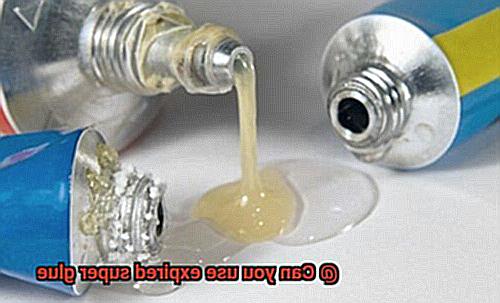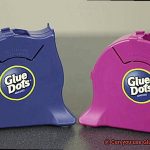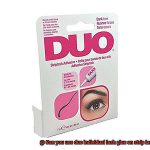What about when that little tube of adhesive reaches its expiration date? Is it game over for our sticky savior, or does it still have a few tricks up its sleeve? Join me on this quest as we uncover the truth about expired super glue and explore its untapped potential.
Now, don’t be too quick to toss that expired tube into oblivion just because of a pesky expiration date. Some crafty DIYers swear by the resourcefulness of expired super glue. With a dash of creativity and an adventurous spirit, we might just discover surprising uses for this seemingly past-its-prime adhesive.
But before we dive headfirst into the exciting possibilities, let’s get acquainted with the science behind super glue’s expiration. You see, most super glues contain a chemical called cyanoacrylate that loves to polymerize at lightning speed when it senses moisture. Over time, exposure to air can cause our trusty adhesive to harden and lose some of its bonding mojo.
However, caution is key when dealing with expired super glue. Adhesives past their prime may not perform as flawlessly as their fresh counterparts – think weaker bonds, slower adhesion times, and reduced overall strength. So while it may not be your go-to for high-stress situations or critical repairs, there’s still hope for expired glue in more laid-back environments.
Surprisingly enough, there are practical uses for our aging adhesive friend. Need a temporary fix for that pen without a cap? A thin coat of expired super glue can work wonders in extending its lifespan. Got some shattered pottery lying around? With a careful touch of expired glue, you might just resurrect those broken pieces into charming yet functional works of art.
To truly tap into the potential of expired super glue, we must embrace its limitations and acknowledge the risks. But let’s not dismiss it entirely – innovation and creativity often bloom when we think outside the expiration date. So, if you stumble upon a tube of expired super glue, hold off on that trash bin trip just yet. Stick around as we venture deeper into the world of expired super glue, debunking myths and uncovering exciting uses along the way.
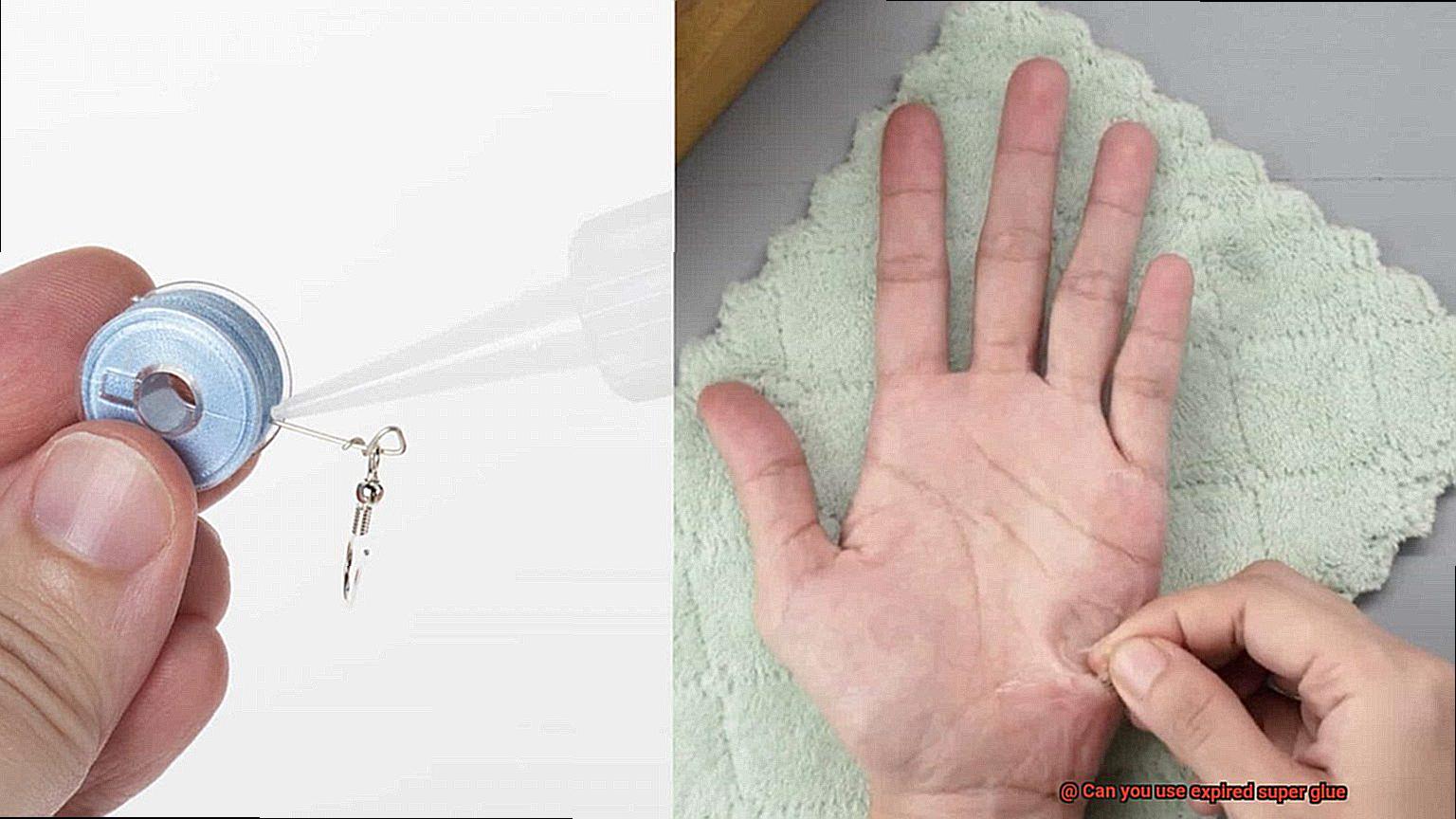
Whether you’re a DIY enthusiast, an artsy soul, or just someone who hates throwing things away, this journey is for you.
What is Super Glue?
Contents
This extraordinary adhesive has revolutionized the way we bond materials together. In this article, we will explore the science behind Super Glue, uncovering its composition, properties, and diverse applications.
Unlocking the Composition:
Super Glue, also known as cyanoacrylate adhesive, is made up of cyanoacrylate monomers. These tiny molecules eagerly polymerize when exposed to moisture, transforming the liquid glue into a solid polymer. This unique chemical reaction occurs upon contact with moisture from the air or the surfaces being bonded.
The Need for Speed:
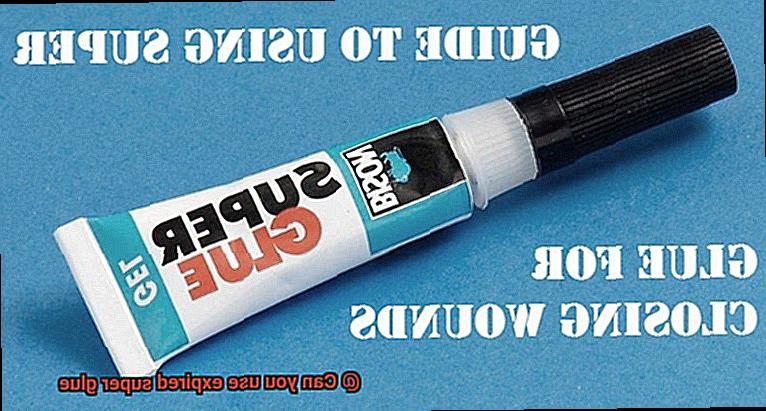
One of Super Glue’s defining features is its lightning-fast bonding ability. Within seconds of application, it forms strong bonds between surfaces. This rapid curing time makes it ideal for projects that require immediate adhesion.
Versatile and Mighty:
Super Glue’s true strength lies in its versatility. It can securely bond a wide range of materials, including plastics, metals, rubber, ceramics, and even certain types of wood. Its reliability transcends industries and hobbies alike, making it a go-to adhesive for any task at hand. Furthermore, Super Glue exhibits impressive resistance to heat, water, and most chemicals.
Invisibility at Its Finest:
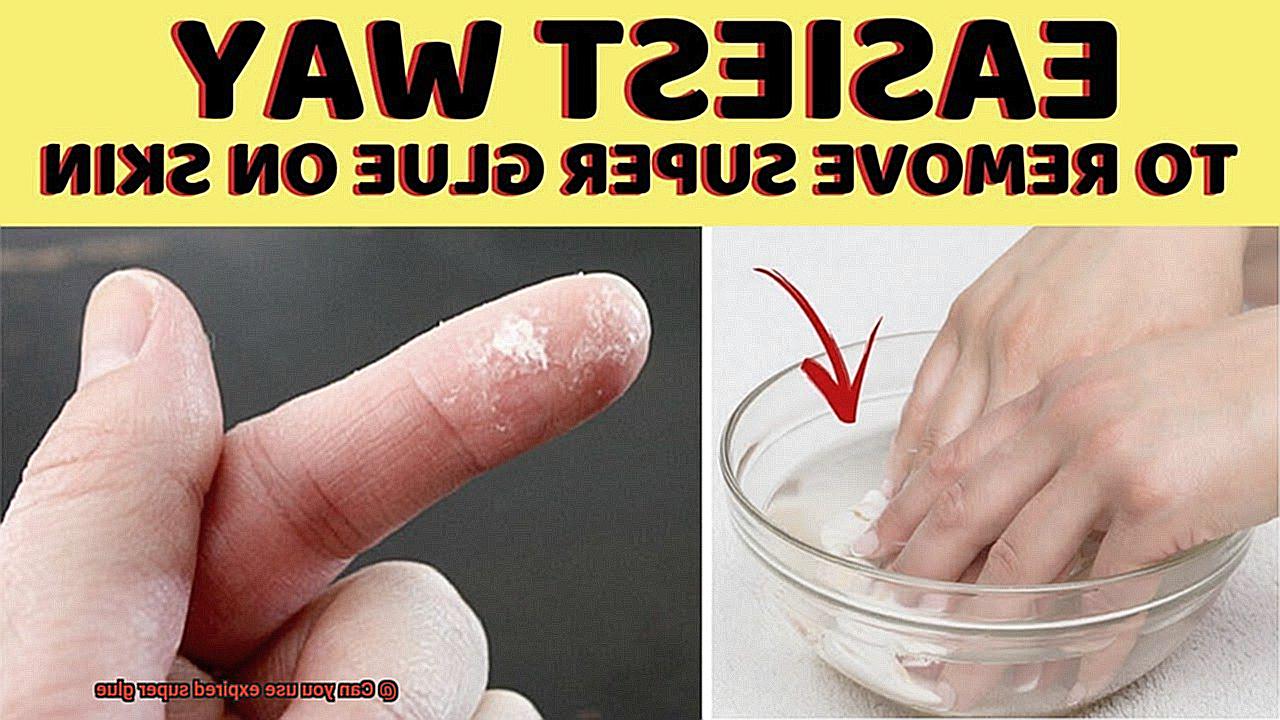
When using Super Glue, expect your bonds to dry clear. This transparency ensures virtually invisible connections that seamlessly blend into the surface. Whether you’re repairing broken objects or working on intricate crafts, Super Glue guarantees a clean and aesthetically pleasing finish.
Time Waits for No Glue:
While Super Glue boasts incredible bonding properties, its effectiveness diminishes over time once opened. Exposure to air and moisture can degrade the adhesive’s performance and bonding strength. To ensure optimal results, it is recommended to use Super Glue within one year of opening the container.
Applications Galore:
Super Glue finds its applications in a plethora of fields. From household repairs to arts and crafts projects, this adhesive is a reliable choice. It can mend shattered ceramics, repair cherished jewelry, tighten loose screws, and even construct intricate models.
Does Super Glue Have an Expiration Date?
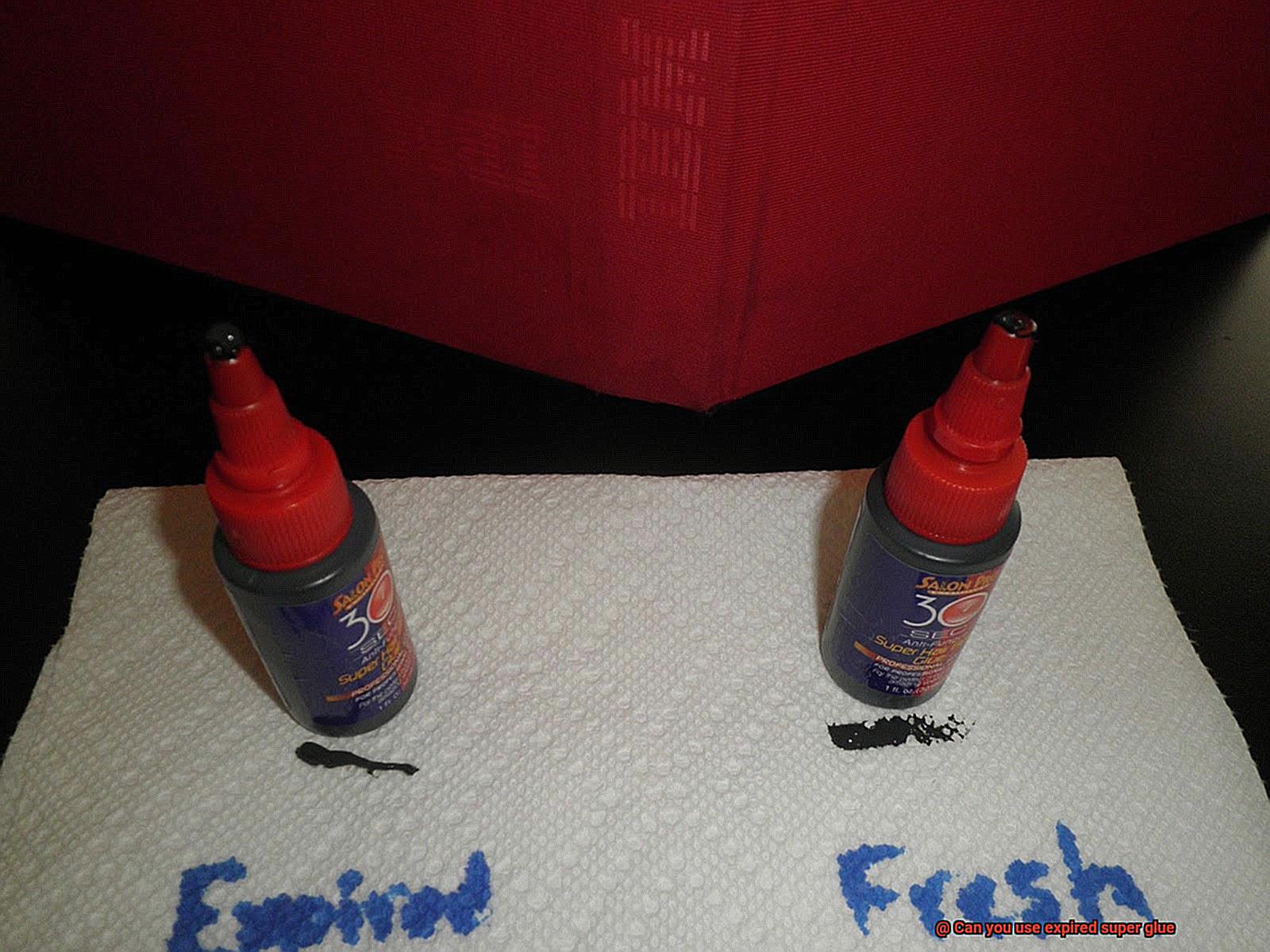
Super glue, that trusty adhesive we all turn to in times of need, is a true lifesaver. Its ability to quickly dry and create strong bonds has made it a staple for fixing broken items or completing craft projects. However, what many people may not realize is that super glue does indeed have an expiration date. Ignoring this date can lead to disappointing results and potentially compromised safety.
The expiration date of super glue is typically printed on the packaging. This date indicates the expected period during which the glue will remain effective. Using expired super glue can result in weaker bonds and less reliable adhesion. Over time, the chemical composition of the glue can break down, compromising its performance.
Several factors can accelerate this degradation process. Exposure to air, temperature fluctuations, and moisture all contribute to the breakdown of the adhesive properties. To ensure the longevity of your super glue, it is crucial to store it in a cool, dry place and tightly seal the container after each use.
If you find yourself with expired super glue, it is best to dispose of it properly and get a fresh bottle for your project. Using expired super glue not only leads to subpar results but also poses safety risks. The adhesive may not adhere securely or could potentially cause damage if it fails.
To avoid disappointment and ensure the effectiveness of your super glue, always check the expiration date before using it. This is especially important if the glue has been stored for a long time or under unfavorable conditions. Additionally, if you are unsure about the effectiveness of your super glue, perform a small test application before using it on important or valuable items.
What Happens When Super Glue Expires?
Super glue, the mighty adhesive superhero we all rely on, has a secret weakness – expiration. In this blog post, we’ll uncover the truth about what happens when super glue reaches its expiration date. From weakened bonds to clumpy consistency, we’ll explore the effects of expired super glue and why it’s important to use fresh glue for optimal results. So, grab your capes and let’s dive into the sticky world of expired super glue.
The Effects of Expired Super Glue:
When super glue expires, its effectiveness and bonding strength may be compromised. The chemical composition of the glue can change, leading to a decrease in its adhesive properties. Here are some common issues that occur with expired super glue:
Thick and Clumpy Consistency:
Expired super glue often becomes thick or clumpy. This change in texture makes it difficult to apply the glue evenly and may result in an uneven bond or weak adhesion.
Improper Drying:
Another problem that can occur with expired super glue is that it may not dry properly. The glue may remain tacky or sticky even after the recommended drying time, which can be frustrating when trying to complete a project.
Weaker Bonding Strength:
Expired super glue may not bond surfaces as securely as fresh glue. The bond may be weaker and more prone to breaking or coming apart over time, especially with critical applications.
Improving Usability of Expired Super Glue:
If you find yourself in a pinch with only expired super glue available, there are a few tricks you can try to improve its usability. One option is to warm the glue slightly by placing the bottle in warm water. This can help to thin out the glue and make it easier to work with. Alternatively, mixing in a small amount of acetone or nail polish remover can also help to thin out the glue.
Why Fresh is Best:
While it may be tempting to use expired super glue in a hurry, it’s always advisable to use fresh glue for optimal performance and reliability. Expired glue may not provide the same level of adhesion and can lead to project failures or disappointing outcomes. To ensure your projects stay intact and secure, it’s best to be a superhero with your adhesive choices and bid farewell to expired super glue.
Factors That Affect the Shelf Life of Super Glue
Super glue, also known as cyanoacrylate adhesive, is a popular adhesive known for its fast-drying and strong bonding properties. However, like any other product, super glue has a limited shelf life. Understanding the factors that affect its shelf life is crucial to ensure its effectiveness and usability.
- Storage Conditions: Proper storage is key to maintaining the shelf life of super glue. It should be stored in a cool, dry place away from extreme temperatures and direct sunlight. Exposure to heat and moisture can degrade the adhesive, reducing its effectiveness. Additionally, ensuring the cap is tightly closed after each use prevents air exposure, which can accelerate the curing process and shorten the shelf life.
- Type of Super Glue: Different brands and formulations of super glue have varying shelf lives. It is important to check the expiration date on the packaging. Generally, most commercially available super glues last for one to two years from the date of manufacture. Choosing fresh glue ensures optimal performance.
- Quality of Packaging: The quality of packaging plays a role in extending the shelf life of super glue. Airtight seals protect the adhesive from air exposure, which can cause premature curing. Reputable brands invest in robust packaging materials to maintain the quality of their products.
- Exposure to Air: Excessive exposure to air can accelerate the curing process of super glue, reducing its shelf life. Closing the cap promptly after use and avoiding leaving the adhesive tube open for too long minimizes air exposure and extends its usability.
- Contamination: Contaminants such as dirt, dust, oil, or other substances can interfere with the bonding process of super glue and reduce its shelf life. It is important to ensure that surfaces are clean before applying the adhesive.
- Age of the Glue: Over time, even under ideal storage conditions, the components of super glue may degrade, leading to a decrease in performance. Using recently purchased glue ensures optimal bonding results.
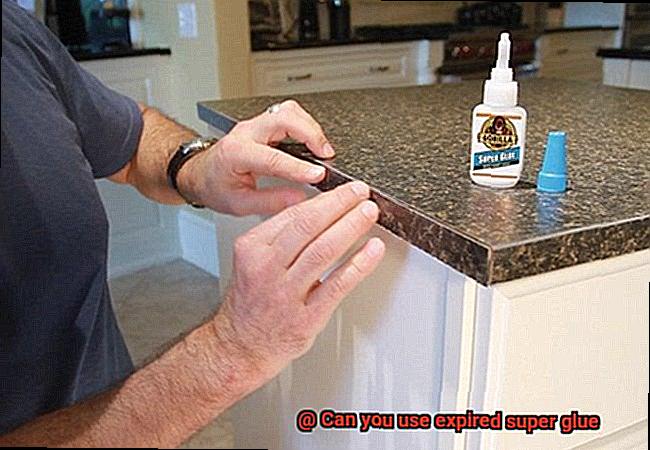
Stabilizers in Super Glue Formulas
Super glue, also known as cyanoacrylate adhesive, is a powerful and fast-acting adhesive that can bond almost anything together. But have you ever wondered how it stays in that liquid state until you’re ready to use it? Well, the secret lies in the stabilizers added to its formula. Stabilizers play a crucial role in enhancing the shelf life and performance of super glue.
So, what exactly do stabilizers do? Their main purpose is to prevent premature polymerization. When exposed to moisture or certain chemicals, cyanoacrylate adhesives like super glue start to react and form a strong bond. Stabilizers help slow down this reaction, keeping the adhesive in a liquid state until you’re ready to apply it.
The most common stabilizer used in super glue formulas is hydroquinone. It acts as an inhibitor, preventing the adhesive from bonding too quickly. Hydroquinone works by scavenging free radicals, which are responsible for initiating the polymerization process. By neutralizing these free radicals, the stabilizer helps extend the shelf life of the glue.
But hydroquinone isn’t the only stabilizer out there. Super glue formulas may also contain other organic acids and phenols that serve as inhibitors and contribute to the overall stability of the adhesive.

Now, here’s the thing: when super glue reaches its expiration date, the effectiveness of these stabilizers may start to decline. This can lead to a faster polymerization process, making the adhesive less effective or even unusable. That’s why it’s generally recommended to avoid using expired super glue for critical or high-stress applications.
However, if you find yourself in a bind and expired super glue is your only option, there are a few things you can try to potentially improve its performance. First, make sure to store the glue properly in a cool and dry place. This can help slow down the degradation of stabilizers. You can also try activating the adhesive by adding a small amount of water to the surface before applying the glue. Water acts as a catalyst for the polymerization process and may help compensate for the decreased effectiveness of the stabilizers.
But remember, using expired super glue comes with risks. Always test it on a small and inconspicuous area before applying it to your desired surface. If the bond appears weak or fails altogether, it’s best to seek a fresh supply of super glue.
Can You Use Expired Super Glue?
Let’s dive into the topic and explore the pros and cons of using expired super glue.
Super glue, also known as cyanoacrylate adhesive, is a popular choice for bonding various materials together. However, like any other product, super glue has an expiration date for a reason. The effectiveness and bonding strength of the glue may diminish over time. Therefore, using fresh super glue is generally recommended for optimal results, especially for important projects.
So, what about expired super glue? Can it still be usable? Well, it depends. If the expired super glue has been stored properly in a cool, dry place away from direct sunlight and extreme temperatures, it may still retain some of its adhesive properties. However, the longer the super glue has been expired, the less likely it is to work effectively.
Before using expired super glue, it’s always a good idea to perform a small test to check its bonding strength. Apply a small amount of the glue on a non-critical surface and allow it to dry completely. Then try to break the bond gently to see if it holds. If the bond holds well without any signs of weakness or detachment, you can consider using the expired super glue for minor projects or temporary fixes.
However, I would advise against using expired super glue for critical applications such as heavy-duty repairs or load-bearing joints. The adhesive properties may not be reliable enough, which could lead to failure or compromise the safety of the structure.
Testing Expired Super Glue Before Use
When it comes to expired super glue, it’s important to tread cautiously before diving into your DIY projects. Just like that forgotten carton of milk in your fridge, super glue has an expiration date for a reason.
Over time, its bonding strength and effectiveness can dwindle faster than a melting ice cream cone on a sizzling summer day. So, before you embark on that project or fix, take a moment to assess whether your expired glue still has what it takes to get the job done.
To test the viability of your expired super glue, start by selecting a non-porous surface like glass or plastic – something that won’t absorb the glue. Apply a small amount and take note of how it spreads and dries. Does it glide smoothly like a figure skater on ice? Does it dry quickly and securely, like a vault locking up its secrets? If the answer is yes, then there’s a good chance your expired glue is still up for the task.
But wait, we’re not done yet. Another test you can perform is checking the bond strength of the glue. Apply a tiny amount on two objects and press them together firmly. Now, give it a gentle tug. Does the bond hold tight, refusing to let go? Or does it crumble like a stale cookie, leaving you disappointed and in need of fresh adhesive? If your expired glue stands strong without any signs of weakness or detachment, consider yourself lucky – you might have just struck gold.
However, keep an eagle eye out for red flags during your testing process. Check the color and consistency of the glue. Has it morphed into a discolored mess or transformed into a thick and lumpy nightmare? If so, it’s clear that your glue has well and truly passed its prime. Additionally, consider the storage conditions of the glue. Has it been subjected to extreme temperatures or moisture? If the answer is yes, it may have degraded faster than a crumbling sandcastle and might not be reliable anymore.
Now, here’s an important disclaimer: even if your expired super glue passes these tests with flying colors, it may not provide the same level of bonding strength and durability as fresh glue. So, it’s always recommended to use fresh glue for critical applications or when a strong bond is required. Think of your expired glue as more of a sidekick for minor projects or temporary fixes.
ifcwvElwlrA” >
Conclusion
In conclusion, the allure of using expired super glue may be strong, but it’s crucial to weigh the potential risks and limitations. Expired super glue often becomes thick and clumpy, leading to improper drying and weaker bonding strength. These factors can result in lackluster outcomes and compromised safety.
However, there are practical applications for expired super glue in less critical scenarios. It can serve as a temporary fix or aid in minor projects where a robust bond isn’t necessary. For instance, it can breathe new life into a capless pen or mend shattered pottery.
To ensure optimal performance and reliability, it is always recommended to opt for fresh super glue when tackling important or high-stress tasks. Fresh glue boasts optimal bonding properties and is less prone to failure.
Numerous factors influence the shelf life of super glue, including storage conditions, type of adhesive, packaging quality, exposure to air, contamination, and age. To prolong its shelf life, store the adhesive in a cool and dry place, seal the container tightly after each use, and ensure surfaces are clean before application.
Stabilizers play a vital role in maintaining the liquid state of super glue until it’s ready for use. They neutralize free radicals that initiate the bonding process, preventing premature polymerization. However, as super glue reaches its expiration date, stabilizers may lose effectiveness.
Before utilizing expired super glue, it’s prudent to conduct a small test on a non-critical surface to gauge its bonding strength. If the bond holds firm without any signs of weakness or detachment, you can consider employing expired super glue for minor projects or temporary fixes.

